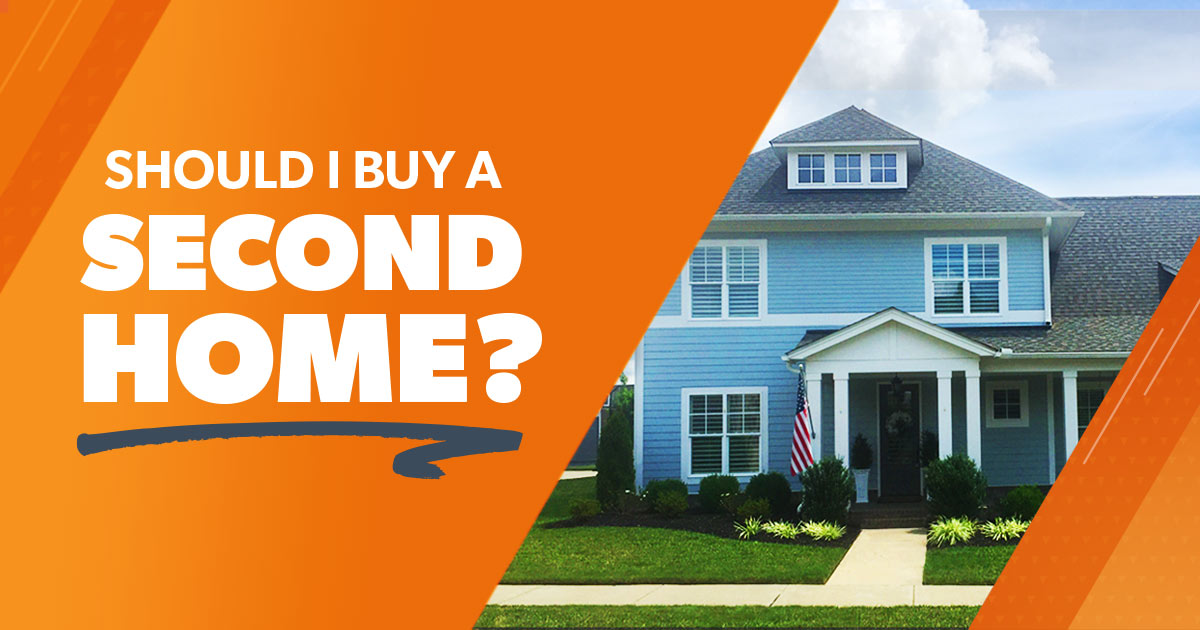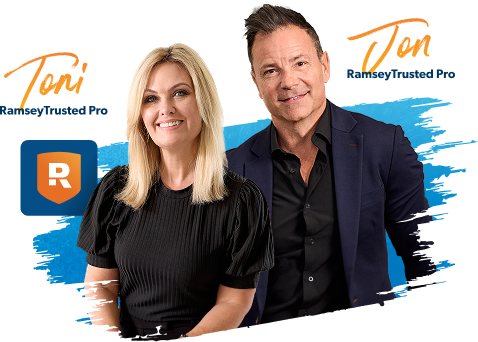Buying a Second Home: Is It Right for You?
8 Min Read | Apr 17, 2025

Okay, so you’re thinking about buying a second home. Maybe you’ve been watching hours of HGTV, and you’re itching to try the latest house flipping design trends. Or maybe you want to diversify your portfolio through real estate. Or perhaps you’re just ready to have a place of your own close to the grandkids.
Whatever the reason, buying a second home is a big deal! It’s a riskier investment than most people realize, and it takes a lot of work. We're not discouraging you from doing it—as long as it’s the right decision for you. Let’s discuss some of the most important factors to consider before you move forward.
Evaluate Why You’re Buying a Second Home
The first thing you need to establish is why you’re thinking about buying a second home. Let’s examine the most common reasons so you can get a better grasp on your own motives.
Vacation Property
You may want to buy a place at the beach, in the mountains or close to family. We get that! And if you’re on Baby Step 7, we can get on board. However, pause and consider the trade-off. If you just want a vacation home two or three times per year, there may be a less stressful way, such as spending money on a nice Airbnb from time to time. Don’t base your decision to buy a second home on pure emotion or a desire to keep up with the Joneses.
Investment
There are two primary real estate investment strategies for buying a second home: to flip and resell it, or to rent it out as a source of passive income.
Rental Property
When it comes to renting a second home, you need to go into that commitment with eyes wide open. Here are several things you need to keep in mind:
- Rental income isn’t guaranteed. Tenants come and go. Unless it’s in a resort or tourist area, you might go weeks or months without renters.
- Renters can cost you money. Even if you ask for and check references, you can’t guarantee that others will take care of your property. People can do way more damage than what’s covered in a security deposit!
- Long-distance properties need local love. If you want to purchase a second home to rent out, the smart move is to buy one in your area so you can keep an eye on it and make minor repairs when necessary.
Flipping and Reselling
As far as flipping a house goes, this can be a great way to generate money—if you’re ready to do the work. It isn’t as glamorous as HGTV makes it seem! There’s way more hassle and headache to home renovations than they cover in those 30-minute episodes. You need to consider whether or not you have the skills, patience and time to flip quickly. After all, time is money!
You also need to think through the tax implications—specifically capital gains tax. This applies to you if you sell something for more than the price you paid for it, like a house. If you flip and resell a house without owning and/or living in it for at least two years, you’re likely going to pay taxes on the profit. Make sure you prepare for that extra expense and don’t get caught off guard.
Outrageous Generosity
You might want to buy a home to use it as a way to bless other people through outrageous generosity. We know that this reason may not be so common—but here at Ramsey we like to do things differently! If you’re on Baby Step 7, you could own a second home and allow people who are in need of housing, or who just need to get away for a bit, to stay there. When it comes to giving, you don’t have to be confined to cash!
Buy or Sell Your Home This Spring With Confidence
Now is a great time to buy or sell your home. Get ahead of the competition with help from a pro who’ll fight for you to get the best deal.
Make Sure You Can Afford to Buy a Second Home
This is the most important question you’ll ask yourself throughout the entire process. Can you afford a second home? Let’s dig into the specifics.
Pay for your second home with cash.
Yes—we're serious about this. You should pay for the house and all expenses associated with it (such as closing costs) with cash. You should never take out loans for a second property, even if it’s an investment. A loan is always a risk. If you take out a mortgage, you’ve added an element of uncertainty in your future. No matter what’s going on with you—job loss, death in the family, serious illness—that mortgage company expects its payment every month. This second home should be a blessing—not a burden!
Save up an emergency fund.
In addition to paying for the house with cash, save up an emergency fund of three to six months of expenses to cover all of the costs associated with the home. This includes:
- HOA fees
- Homeowner’s insurance
- Utilities
- Property taxes
- Repairs and maintenance
This emergency fund will help you cover the cost of any maintenance issues that come up. And it’s not a question of if they’ll come up, but when!
Find expert agents to help you buy your home.
A second home may also impact your tax situation, because the IRS treats second homes and vacation homes differently than your primary residence. Make sure you talk to a tax pro to know what you’re getting into.
Consider furniture and housing expenses.
A house doesn’t do you any good if it stands there empty! Unless you’re just flipping and reselling, come up with a budget for spending on furniture for your new place, and buy it all with—you guessed it—cash!
Prepare for the Commitment
Real estate is a hands-on and time-consuming endeavor. If you’re going to do this well, you need to be passionate about it. Here are a few questions to ask yourself before you dive in headfirst:
- Am I clear on my goals?
- Do I enjoy working with my hands?
- Am I willing to take on the responsibility of a second property?
- Do I have enough time to dedicate to this?
- Is this an emotional or impulsive decision?
- Have I thought about this for a while?
- Is my spouse/family on board?
Still tracking with us? All right then—let’s come up with a plan for this second home you’re going to buy!
Want More Expert Real Estate Advice?
Sign up for our newsletter! It’s packed with practical tips to help you tackle the housing market and buy or sell your home with confidence—delivered straight to your inbox twice a month!
How to Buy a Second Home
Ready to roll? Here are three steps to buying a second home.
1. Set a budget.
We’ve already established that you should pay for your second home with cash. Get a specific dollar amount in mind so you know exactly when you’re ready to make your move. Come up with a dollar amount for each of these categories:
- The property itself
- Closing costs
- Furniture and appliances (if you need them)
- Your emergency fund, including enough money to cover three to six months of:
- HOA fees
- Homeowners insurance
- Utilities
- Property taxes
Don’t pull the trigger until you’ve saved up the exact dollar amount you’ll need to buy your second home. Pro tip: Save the money for your second home in a money market account to take advantage of higher interest rates. Or, if you’re not planning to buy a second property any time soon, you could invest that money in growth stock mutual funds to take advantage of compound growth. There’s always risk in the stock market, though, so don’t invest it if you’re planning to buy within five years.
2. Do your research.
This is a big decision you’re making, so don’t rush it! Take time to understand exactly what it is you’re looking for. Scope out different neighborhoods. Drive and walk around the areas that grab your interest. Here a few pro tips to follow when you’re on the hunt:
- Don’t buy the best property in the neighborhood (or area). For equity’s sake, look for a house on the low/medium end of the best neighborhood instead of the best house in a cheap/run-down area.
- Decide whether you want to work with a management group. A property management group makes your life as a landlord more convenient, but using one will eat into your profit.
- Know the local laws. Tax laws vary from state to state, so do your homework and meet with a tax pro to know what you’re getting into.
3. Work With a Trusted Real Estate Agent
Do not try to go it alone! A real estate agent has access to all sorts of information that you don’t, as well as insight and experience into the market. Working with a professional will save you tons of time and spare you lots of headaches—plus you’ll save money and get a much better deal in the end.
Is It Time to Buy?
When you weigh your options and have a solid game plan, buying a second home can be an exciting experience—a dream come true! But don’t let your dream turn into a nightmare. That house can quickly become a burden if you rush to buy before you’re ready.
It always helps to get a second opinion when you’re making a big decision like this, which is why we want you to work with a top-notch real estate professional who can help you make the right call.
Did you find this article helpful? Share it!

We Hear You!
We’re considering adding the ability to save articles to your Ramsey account.




